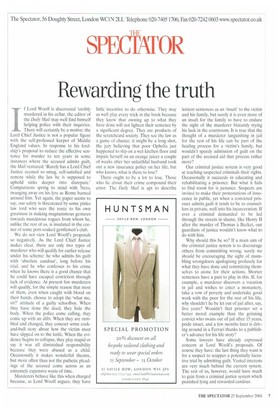Rewardin2 the truth
If Lord Woolf is discovered 'orribly murdered in his cellar, the editor of the Daily Mail may well find himself helping police with their inquiries.
There will certainly be a motive: the Lord Chief Justice is not a popular figure with the self-professed keeper of Middle England values. In response to his lordship's proposal to reduce the effective sentence for murder to ten years in some instances where the accused admits guilt, the Mail ventured: 'Rarely has a Lord Chief Justice seemed so smug, self-satisfied and remote while the law he is supposed to uphold sinks deeper into disrepute.' Comparisons spring to mind with Nero, twanging away on his lyre as Rome burned around him. Yet again, the paper seems to say, our safety is threatened by some pinko law lord who sees the route to his own greatness in making magnanimous gestures towards murderous rogues from whom he, unlike the rest of us, is insulated in the corner of some port-soaked gentlemen's club.
We do not view Lord Woolf s proposals so negatively. As the Lord Chief Justice makes clear, there are only two types of murderer who will qualify for earlier release under his scheme: he who admits his guilt with 'absolute candour', long before his trial, and he who confesses to his crime when he knows there is a good chance that he could have escaped conviction through lack of evidence. At present few murderers will qualify, for the simple reason that most of them, even when caught with blood on their hands, choose to adopt the 'what me, sir?' attitude of a guilty schoolboy. When they have done the deed, they hide the body. When the police come calling, they come up with an alibi. When they are rumbled and charged, they concoct some cockand-bull story about how the victim must have slipped on to the knife. When the evidence begins to collapse, they play stupid or say it was all diminished responsibility because they were abused as a child. Occasionally it makes wonderful theatre, but more often than not the pathetic pleadings of the accused come across as an extremely expensive waste of time.
Murderers behave like this when charged because, as Lord Woolf argues, they have little incentive to do otherwise. They may as well play every trick in the book because they know that owning up to what they have done will not lighten their sentence by a significant degree. They are products of the scratchcard society. They see the law as a game of chance: it might be a long shot, the jury believing that poor Ophelia just happened to slip on a wet kitchen floor and impale herself on an orange juicer a couple of weeks after her unfaithful husband took out a new insurance policy on her life, but who knows, what is there to lose?
There ought to be a lot to lose. Those who lie about their crime compound their error. The Daily Mail is apt to describe
lenient sentences as an 'insult' to the victim and his family, but surely it is even more of an insult for the family to have to endure the sight of the murderer blatantly trying his luck in the courtroom. It is true that the thought of a murderer languishing in jail for the rest of his life can be part of the healing process for a victim's family, but wouldn't speedy admission of guilt on the part of the accused aid that process rather more?
Our criminal justice system is very good at teaching suspected criminals their rights. Occasionally it succeeds in educating and rehabilitating a prisoner. But what it fails to find room for is penance. Suspects are invited to make their protestations of innocence in public, yet when a convicted prisoner admits guilt it tends to be to counsellors in private, well into his incarceration. If ever a criminal demanded to be led through the streets in shame, like Henry II after the murder of Thomas a Becket, our guardians of justice wouldn't know what to do with him.
Why should this be so? If a main aim of the criminal justice system is to discourage others from committing wrong, surely we should be encouraging the sight of mumbling wrongdoers apologising profusely for what they have done and committing themselves to atone for their actions. Shorter sentences have a part to play in this. If, for example, a murderer discovers a vocation in jail and wishes to enter a monastery, take a vow of poverty and undertake good work with the poor for the rest of his life, why shouldn't he be let out of jail after, say, five years? Wouldn't that prisoner set a better moral example than the grinning convict who swans out of jail after 15 years, pride intact, and a few months later is driving around in a Ferrari thanks to a publisher's advance for his life story?
Some lawyers have already expressed concern at Lord Woolfs proposals. Of course they have: the last thing they want is for a suspect to scupper a potentially lucrative trial by admitting guilt. Vested interests are very much behind the current system. The rest of us, however, would have much to gain from a criminal justice system which punished lying and rewarded candour.


























































































 Previous page
Previous page